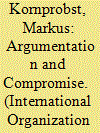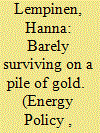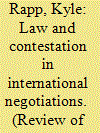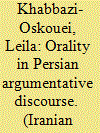| Srl | Item |
| 1 |
ID:
077293


|
|
|
|
|
| Publication |
2007.
|
| Summary/Abstract |
How do states come to select norms? I contend that, given a number of conditions are present, states select norms in three ideal-typical stages: innovative argumentation, persuasive argumentation, and compromise. This norm selection mechanism departs from the existing literature in two important ways. First, my research elaborates on the literature on advocacy networks. I explain why agents engage in an advocacy for a normative idea in the first place; I add the epistemic dimension of reasoning to argumentation theory; and I show in detail the pathways through which persuasive argumentation links an advocated idea and already-established sets of meaning. Second, synthesizing rationalist and constructivist selection mechanisms, I contend that successful argumentation makes recalcitrant actors eager to reach a compromise with the advocates as long as this does not violate their most cherished beliefs. The Republic of Ireland's eventual selection of the territorial status quo norm in the late 1990s lends empirical evidence to this norm selection mechanism
|
|
|
|
|
|
|
|
|
|
|
|
|
|
|
|
| 2 |
ID:
166363


|
|
|
|
|
| Summary/Abstract |
While the share of peat in Finland's energy mix today amounts to only around 4%, peat recurrently returns to the center stage in Finnish energy-related public debates. As an indigenous energy resource, peat is a welcome addition to the energy mix of the heavily energy-dependent country. In addition, the employment impacts of peat production are considered significant. These benefits are, however, contradicted by the environmental impacts and climate emissions caused by peat energy. The conflicting interests revolving around peat have resulted in constantly shifting national peat policies as well as infrequent “explosions” of public and political debates on peat production. This article explores two of the most recent politicizations of peat through an empirical focus on the short-lived promotion campaigns that sparked widespread public debate: the 2010 “2 prosenttia” [2%] internet campaign from the state-majority-owned energy company VAPO and the 2017 “Turveinfo” [peat info] campaign launched by The Bioenergy Association of Finland. Through an analysis of the colorful and provocative promotion campaigns, this article (1) explores the arguments and rhetoric through which political support of peat is being acquired from the Finnish public and (2) examines what crises in the 2010s Finland peat is constructed as the (only) logical answer for.
|
|
|
|
|
|
|
|
|
|
|
|
|
|
|
|
| 3 |
ID:
079903


|
|
|
|
|
| Publication |
2007.
|
| Summary/Abstract |
Irredentism developed into an anomaly in post-World War II Europe and - contradicting the dire predictions of the 1990s - has remained an anomaly even since the end of the Cold War. Focusing on the renunciation of the FRG's and the Republic of Ireland's irredentist claims, I propose a novel route to analyse dispute settlement. I contend that nations justify their stance in a conflict. In the case of irredentism, they do not merely assert that a disputed territory is their land but justify to themselves and others why the disputed territory is rightfully theirs and why pursuing the irredentist stance is worthwhile. The disruption of this justification - what I call dejustification - constitutes a pathway to dispute settlement. Dejustification occurs through a change of the ideational environment that serves as the resource for justifying the claim and an advocacy that constructs a mismatch between environment and claim
|
|
|
|
|
|
|
|
|
|
|
|
|
|
|
|
| 4 |
ID:
176498


|
|
|
|
|
| Summary/Abstract |
What is the role of rhetoric and argumentation in international relations? Some argue that it is little more than ‘cheap talk’, while others say that it may play a role in persuasion or coordination. However, why states deploy certain arguments, and why these arguments succeed or fail, is less well understood. I argue that, in international negotiations, certain types of legal frames are particularly useful for creating winning arguments. When a state bases its arguments on constitutive legal claims, opponents are more likely to become trapped by the law: unable to develop sustainable rebuttals or advance their preferred policy. To evaluate this theory, I apply qualitative discourse analysis to the US arguments on the crime of aggression at the Kampala Review Conference of the International Criminal Court – where the US advanced numerous arguments intended to reshape the crime to align with US interests. The analysis supports the theoretical propositions – arguments framed on codified legal grounds had greater success, while arguments framed on more political grounds were less sustainable, failing to achieve the desired outcomes. These findings further develop our understanding of the use of international law in rhetoric, argumentation, and negotiation.
|
|
|
|
|
|
|
|
|
|
|
|
|
|
|
|
| 5 |
ID:
145932


|
|
|
|
|
| Summary/Abstract |
Languages have their own distinctive styles of argumentation. It seems some languages like Arabic and Persian have a preference for using the “oral” features of parataxis, formulaicity and repetition as persuasive devices in argumentation. The purpose of this article is first to examine these “oral” characteristics in Persian argumentation, and then to tie together the two areas of research: the study of orality and the study of metadiscourse. The article claims that these oral characteristics in Persian are means of gaining rhetorical effectiveness. Therefore, they should be considered as metadiscourse devices used to create a bond between writer and reader.
|
|
|
|
|
|
|
|
|
|
|
|
|
|
|
|